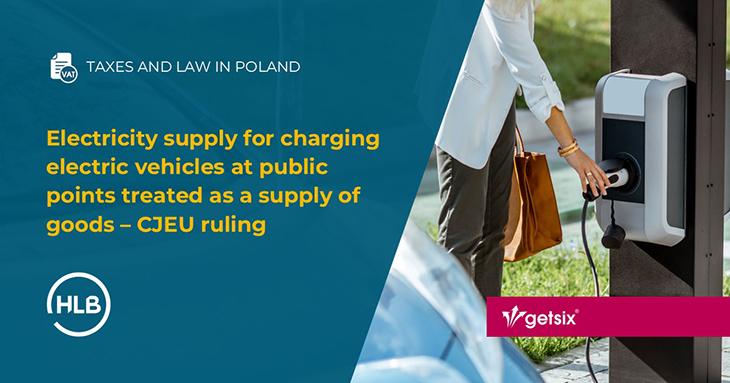Electricity supply for charging electric vehicles at public points treated as a supply of goods – CJEU ruling
On October 17, 2024, the Court of Justice of the European Union (CJEU) issued another crucial ruling on VAT taxation in the context of electromobility. In case C-60/23 (Digital Charging Solutions), the court confirmed that the supply of electricity for charging electric vehicles at public charging points is treated as a supply of goods, even when an intermediary is involved. This ruling is crucial for VAT settlements in the rapidly growing electromobility sector.
Electricity supply as a supply of goods
The CJEU emphasized in its judgment that under Article 14(1) of Directive 2006/112/EC (as amended by Directive 2009/162/EC), electricity supplied during the charging of electric vehicles is considered a good rather than a service. This decision aligns with a previous ruling in case C-282/22, where the Court determined that charging electric vehicles constitutes a composite supply in which the supply of electricity is the principal element.
Key components of this service include:
- Providing electricity with the required specifications to vehicle batteries.
- Making charging infrastructure (e.g., public chargers) available.
- Offering technical support to users.
- Enabling mobile applications and payment systems for booking charging points, monitoring transactions, and processing payments.
Despite additional services such as apps or technical support, the predominant role of electricity as a good determines the classification of the overall supply.
Chain transactions and consignment sales
A particularly noteworthy aspect of the ruling concerns cases where an intermediary manages access to charging networks. The CJEU clarified that such situations comprise chain transactions, where electricity is:
- Initially purchased by the charging point operator.
- Resold to an intermediary (e.g., Digital Charging Solutions).
- Ultimately sold to the end user by the intermediary.
This model is defined as a consignment sale under Article 14(2)(c) of the VAT Directive. It implies that the intermediary acts in its own name but on behalf of the end user, which is critical for VAT settlement.
Additional services – single or separate supply?
The CJEU also considered whether ancillary services, such as app access or customer support, should be treated as part of the supply of goods or as separate services. The determining factor is the method of fee calculation:
- If fees are proportional to the amount of energy consumed, ancillary services are part of the principal supply (electricity).
- If fees are fixed, independent of energy consumption, these services should be taxed separately.
Case C-60/23 in context of prior jurisprudence
The ruling aligns with the CJEU’s verdicts focussing on the dominant role of electricity supply in transactions related to vehicle charging. Already in case C-282/22, the Court ascertained that charging electric vehicles, even without an intermediary, constitutes a supply of goods. By contrast and in comparison, in case C-235/18 (Vega International), fuel cards were classified as tools for providing financial services rather than goods. In the case of electric vehicle charging, intermediaries are treated as electricity vendors, not service providers.
Practical implications
The CJEU ruling in case C-60/23 provides critical guidance for entities operating in the electromobility sector. Key takeaways include:
- Adjusting contracts to the consignment model
- Clear invoicing at every transaction stage
- Taxation of ancillary services
- VAT planning
- Managing tax risk
- Considering fuel card analogies
Intermediaries facilitating electricity supply (e.g., platform operators managing charging services) must ensure their contracts align with consignment sales requirements. It should be explicitly stated that they act in their own name but on behalf of end users, essential for VAT compliance.
Both charging point operators and intermediaries must issue invoices consistent with the rules for supplying goods. Invoices should distinguish clearly between the supply of electricity and ancillary services.
Companies must analyse pricing methods for ancillary services, such as app access or technical support. If charges are fixed and independent of energy use, these services should be treated as separate taxable supplies subject to VAT.
Businesses must account for the timing of tax liability within the chain transaction model. This involves determining the appropriate moment for invoicing and recognizing VAT in their records.
The ruling equips companies with tools to defend their tax practices in disputes with authorities. Nevertheless, businesses should conduct thorough analyses of their business models and contracts to mitigate potential ambiguities in settlements.
Although the judgment pertains to electric vehicle charging, its principles may be relevant for addressing VAT issues related to fuel cards. Structural similarities in transactions could justify applying similar VAT rules to other business models.
Conclusion
The CJEU ruling in case C-60/23 sets an important precedent for VAT classification of transactions involving electric vehicle charging. While the decision clarifies the taxation of goods in the electromobility sector, open questions remain regarding the detailed treatment of ancillary services and the potential application of excise duties. Companies operating in this field should adapt their business practices and contracts to align with the guidelines drawn from this ruling to minimize tax risks and effectively manage VAT settlements.
If you have any questions regarding this topic or if you are in need for any additional information – please do not hesitate to contact us:
CUSTOMER RELATIONSHIPS DEPARTMENT

ELŻBIETA NARON
Head of Customer Relationships
Department / Senior Manager
getsix® Group
***





